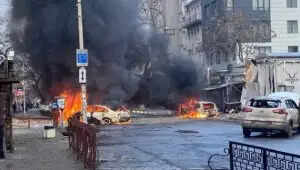Escalating Conflict: Russian Strikes in Ukraine Leave Casualties and Damage
Russian Attacks Intensify in Southern Ukraine

Kyiv: A city in southern Ukraine faced a devastating attack on Wednesday as Russian glide bombs and artillery targeted Kherson, resulting in one fatality and nine injuries. This incident is part of a series of ongoing assaults by Russian forces across the nation.
According to Oleksandr Prokudin, the head of the region, glide bombs struck Kherson in the morning, and when rescue teams arrived, they were met with an artillery barrage from Russian troops. He described this as a calculated tactic by Russia to obstruct rescue efforts and endanger medical personnel and first responders.
The assault caused significant damage to various structures, including a sports facility, a supermarket, residential buildings, and civilian vehicles.
This attack follows a series of deadly strikes, including a recent incident on Palm Sunday when two Russian ballistic missiles hit Sumy, resulting in 35 deaths and over 100 injuries, marking the deadliest attack on Ukrainian civilians this year. The Russian military claimed the strike targeted a meeting of senior military officials but provided no evidence to support this.
Despite an agreement last month between Moscow and Kyiv to pause strikes on energy facilities for 30 days, both sides have accused each other of violating the ceasefire.
On Wednesday, the Russian military reported downing 26 Ukrainian drones across several regions.
When questioned about the potential continuation of the limited ceasefire after 30 days, Kremlin spokesman Dmitry Peskov refrained from providing a definitive answer, stating that a decision would be made later.
Moscow has largely dismissed calls for a comprehensive ceasefire, which President Trump has advocated and Ukraine has supported. Russian President Vladimir Putin has conditioned such a ceasefire on halting Ukraine's mobilization and Western arms supplies, demands that Ukraine has rejected, believing that Russian forces are preparing for a renewed offensive.
Currently, Russian forces maintain a tactical advantage on the battlefield, launching attacks along various sectors of the extensive 1,000-kilometer frontline. Kyiv has expressed concerns that Moscow is planning a new offensive to strengthen its negotiating position.
In a related development, US Secretary of State Marco Rubio and Trump's special envoy Steve Witkoff are set to travel to Paris for discussions with European counterparts aimed at advancing President Trump's objective of ending the conflict and halting the violence.
Rubio is also expected to address strategies for enhancing mutual interests in the region, as stated by State Department spokesperson Tammy Bruce.
Witkoff, who recently met with Putin for nearly five hours, indicated that the Russian leader is seeking a 'permanent peace,' with potential negotiations focusing on Russian claims over five Ukrainian regions.
Ukrainian President Volodymyr Zelenskyy criticized Witkoff's remarks, asserting that Ukraine will never acknowledge any territories temporarily occupied by Russia.
In discussions regarding a prospective agreement that would grant the US access to Ukraine's valuable mineral resources, Ukraine's Economy Minister Yuliia Svyrydenko reported 'significant progress' in negotiations.
She mentioned that both parties are working on a 'memorandum of intent' to encapsulate the positive developments in talks, with plans to formalize the agreement soon.
This deal, pending ratification by the Ukrainian parliament, is expected to create investment opportunities and foster economic growth for both Ukraine and the United States.
